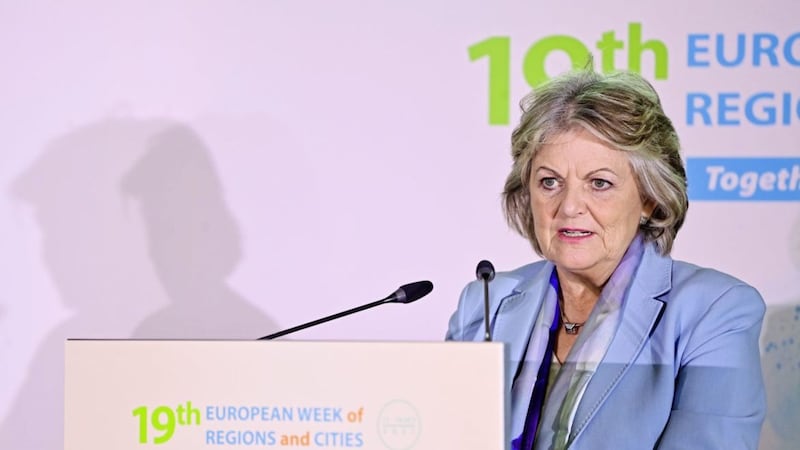THE European party continues... even if the balloons are deflating in the wake of its most interesting guest having left.
The UK delegation has been missing, for obvious reasons, at this first ‘in-person’ European Week of Regions and Cities since Brexit and the pandemic.
The Brussels event has grown into a unique communication and networking platform, bringing together regions and cities from all over Europe, including politicians, administrators, experts and academics.
Over the last 18 years, it has done much to promote policy learning and the exchange of good practice, and on any normal year, in the corridors of power here, you'd have done well to avoid the likes of a Trevor Cummings or Arnold Hatch.
But despite being cut adrift (at its own behest) from the bloc after half a century as one of its key players, the UK’s legacy lives on here – whether you’re talking to officials at a national, regional or local government level, or representatives of private companies and financial institutions, or researchers, students or fellow journalists.
There's been no direct UK input into the hundreds of Regions and Cities Week sessions and workshops across Brussels, focussing on green transition, cohesion, digitalisation, and citizens’ engagement.
Indeed you almost got the impression that the event's lead players Elisa Ferreira, the EU's Commissioner for Cohesion and Reforms, and Apostolos Tzitzikostas, President of the European Committee of the Regions, had deliberately gone out of their ways to avoid making even a passing reference to their old foe.
Yet, the juxtaposition of the Regions and Cities event happening in one part of the Belgian capital, and the European Commission's Maros Šef?ovi? meeting with Brexit Minister Lord Frost in a building just 10 minutes away, has inevitably kept the UK (and Northern Ireland) issue front and centre.
The EU acknowledges that it has caused difficulties for Northern Ireland businesses and insists it will attempt to ease that burden with "a different model", which would remove about 80 per cent of spot checks and cut customs paperwork by 50 per cent.
It prompted one French commentator to claim that Britain has now “won” the battle of Brexit, continuing to have access to the behemoth European market without customs duties and without submitting to European law.
Geopolitics has become important again, and as Lord Frost said earlier in the week: "As we look at Europe from the UK, now that we have left the EU and its rules, the geopolitics of Britain’s position as an offshore island, with particular allies but global interests, come back to the forefront.
"Brexit has changed our international interests and hence will change our patterns of European relationships. But fixing the very serious problem we have in the Northern Ireland Protocol is a pre-requisite for getting to a better place."
Then just yesterday, EU Research Commissioner Mariya Gabriel insisted that the UK simply can’t join the €95.5 billion Horizon Europe research programme until the row over Northern Ireland Protocol is settled.
"Further diplomatic efforts are needed to clear political disagreements before the UK can finalise Horizon Europe association," she told an influential science publication.
“Association is a thematic subject. I'm confident we are ready to tackle it as soon as possible, but transversal issues need to be tackled first,” the Bulgarian added.
The Horizon Europe programme was initially designed to be “open to the world”, but a change in global political tides and the pandemic have led the EU to take a more cautious view on international research cooperation.
Indeed earlier this year some within Europe had tried to lump the UK alongside China and Iran by blocking its access to and participation in the sensitive high-technology Horizon research projects.
The French, for example, sought on security grounds to exclude British scientists from “quantum computing technologies of strategic importance” as well as European space and artificial intelligence research.
While a majority of European capitals moved to overrule that, the issue has suddenly re-emerged in these potentially incendiary comments from Ms Gabriel.
Who says the UK is not still a major talking point in Brussels . . . .





